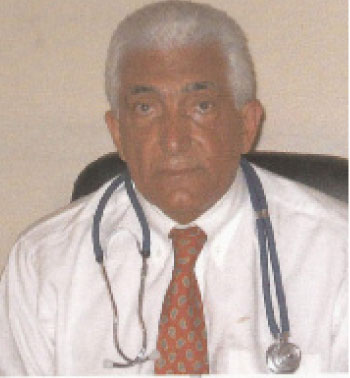
The right lung has three lobes, while the left lung is divided into two lobes and a small structure called the lingual that is the equivalent of the middle lobe on the right. The major airways entering the lungs are the bronchi, which arise from the trachea.
The bronchi branch into progressively smaller airways called bronchitis that end in tiny sacs known as alveolar where gas exchange occurs.
In our today’s edition of Health Matters, Dr Hassan Azadeh, our health adviser and a senior lecturer at the University of the Gambia, who is also a senior physician will be focusing on the correlation of smoking anddeveloping of lung cancer and explains about signs, symptoms and treatment’s facilities in the Gambia.
Cancer of the lung, like all cancers, results from an abnormality in the body’s basic unit of life, the cell. Normally, the body maintains a system of checks and balances on cell growth so that cells divide to produce new cells only when new cells are needed. Disruption of this system of checks and balances on cell growth results in an uncontrolled division and proliferation of cells that eventually forms a mass known as a tumour.
Tumours can be benign or malignant; when we speak of “cancer,” we are referring to those tumours that are malignant. Benign tumours usually can be removed and do not spread to other parts of the body. Malignant tumours, on the other hand, grow aggressively and invade other tissues of the body, allowing entry of tumour cells into the bloodstream or lymphatic system and then to other sites in the body.
This process of spread is termed metastasis; the areas of tumour growth at these distant sites are called metastases. Since lung cancer tends to spread or metastasize very early after it forms, it is a very life-threatening cancer and one of the most difficult cancers to treat. While lung cancer can spread to any organ in the body, certain locations -- particularly the adrenal glands, liver, brain, and bones -- are the most common sites for lung cancer metastasis.
What causes lung cancer?
Smoking
The incidence of lung cancer is strongly correlated with cigarette smoking, with about 90% of lung cancers arising as a result of tobacco use. The risk of lung cancer increases with the number of cigarettes smoked and the time over which smoking has occurred; doctors refer to this risk in terms of pack-years of smoking history (the number of packs of cigarettes smoked per day multiplied by the number of years smoked). For example, a person who has smoked two packs of cigarettes per day for 10 years has a 20 pack-year smoking history. While the risk of lung cancer is increased with even a 10-pack-year smoking history, those with 30-pack-year histories or more are considered to have the greatest risk for the development of lung cancer. Among those who smoke two or more packs of cigarettes per day, one in seven will die of lung cancer.
Tobacco smoke contains over 4,000 chemical compounds, many of which have been shown to be cancer-causing or carcinogenic. The two primary carcinogens in tobacco smoke are chemicals known as nitrosamines and poly cyclic aromatic hydrocarbons. The risk of developing lung cancer decreases each year following smoking cessation as normal cells grow and replace damaged cells in the lung. In former smokers, the risk of developing lung cancer begins to approach that of a non-smoker about 15 years after cessation of smoking.
Passive smoking
Passive smoking or the inhalation of tobacco smoke by non-smokers, who share living or working quarters with smokers, also is an established risk factor for the development of lung cancer. Research has shown that non-smokers who reside with a smoker have a 24% increase in risk for developing lung cancer when compared with non-smokers who do not reside with a smoker. The risk appears to increase with the degree of exposure (number of years exposed and number of cigarettes smoked by the household partner). An estimated 3,000 lung cancer deaths
Air pollution
Air pollution from vehicles, industry, and power plants can raise the likelihood of developing lung cancer in exposed individuals. Up to 1% of lung cancer deaths are attributable to breathing polluted air, and experts believe that prolonged exposure to highly polluted air can carry a risk for the development of lung cancer similar to that of passive smoking.
What are lung cancer symptoms and signs?
Symptoms of lung cancer are varied depending upon where and how widespread the tumour is. Warning signs of lung cancer are not always present or easy to identify. Lung cancer may not cause pain or even any symptoms at all in some cases. A person with lung cancer may have the following kinds of symptoms:
·No symptoms: In up to 25% of people, who get lung cancer, the cancer is first discovered on a routine chest X-ray or CT scan as a solitary small mass sometimes called a coin lesion, since on a two-dimensional X-ray or CT scan, the round tumour looks like a coin. These patients with small, single masses often report no symptoms at the time the cancer is discovered.
·Symptoms related to the cancer: The growth of the cancer and invasion of lung tissues and surrounding tissue may interfere with breathing, leading to symptoms such as cough, shortness of breath, wheezing, chest pain, and coughing up blood. If the cancer has invaded nerves, for example, it may cause pain that travels down the outside of the arm). If a large airway is obstructed, collapse of a portion of the lung may occur and cause infections (abscesses, pneumonia) in the obstructed area.
·Symptoms related to metastasis: Lung cancer that has spread to the bones may produce excruciating pain at the sites of bone involvement. Cancer that has spread to the brain may cause a number of neurologic symptoms that may include blurred vision, headaches, seizures, or symptoms of stroke such as weakness or loss of sensation in parts of the body.
When should one consult a doctor?
One should consult a health care professional if he or she develops the symptoms associated with lung cancer, in particular, if they have
·a new persistent cough or worsening of an existing chronic cough
·blood in the sputum
·persistent bronchitis or repeated respiratory infections
·chest pain
·unexplained weight loss and/or fatigue
·breathing difficulties such as shortness of breath or wheezing
What is the treatment for lung cancer?
Treatment for lung cancer can involve surgical removal of the cancer, chemotherapy, or radiation therapy, as well as combinations of these treatments. The decision about which treatments will be appropriate for a given individual must take into account the location and extent of the tumour as well as the overall health status of the patient.
Radiation: Radiation therapy may be employed as a treatment therapy uses high-energy X-rays or other types of radiation to kill dividing cancer cells.
Chemotherapy:may be treated with chemotherapy. Chemotherapy refers to the administration of drugs that stop the growth of cancer cells by killing them or preventing them from dividing.
Experimental therapies: Since no therapy is currently available that is absolutely effective in treating lung cancer, patients may be offered a number of new therapies that are still in the experimental stage, meaning that doctors do not yet have enough information to decide whether these therapies should become accepted forms of treatment for lung cancer.
The World Health Organization has called for governments to institute a total ban on tobacco advertising to prevent young people from taking up smoking. They assess that such bans have reduced tobacco consumption by 16% where instituted. Hopping that the ban of smoking in public places in the Gambia help reduce the number of innocent passive smoker too.
For more information send email to azadehhassan@yahoo.co.uk, text to 00220-7774469 or call on Dr Azadeh Health Show on Afri-radio every Wednesday from 9-9.30 am.



